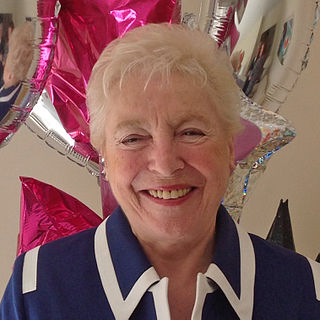
Alvin Eugene Toffler was an American writer, futurist, and businessman known for his works discussing modern technologies, including the digital revolution and the communication revolution, with emphasis on their effects on cultures worldwide. He is regarded as one of the world's outstanding futurists.

A hacker is a person skilled in information technology who achieves goals by non-standard means. The term has become associated in popular culture with a security hacker – someone with knowledge of bugs or exploits to break into computer systems and access data which would otherwise be inaccessible to them. In a positive connotation, though, hacking can also be utilized by legitimate figures in legal situations. For example, law enforcement agencies sometimes use hacking techniques to collect evidence on criminals and other malicious actors. This could include using anonymity tools to mask their identities online and pose as criminals.

A programmer, computer programmer or coder is an author of computer source code – someone with skill in computer programming.
Software engineering is a field within computer science focused on designing, developing, testing, and maintaining of software applications. It involves applying engineering principles and computer programming expertise to develop software systems that meet user needs.

In product development, an end user is a person who ultimately uses or is intended to ultimately use a product. The end user stands in contrast to users who support or maintain the product, such as sysops, system administrators, database administrators, information technology (IT) experts, software professionals, and computer technicians. End users typically do not possess the technical understanding or skill of the product designers, a fact easily overlooked and forgotten by designers: leading to features creating low customer satisfaction. In information technology, end users are not customers in the usual sense—they are typically employees of the customer. For example, if a large retail corporation buys a software package for its employees to use, even though the large retail corporation was the customer that purchased the software, the end users are the employees of the company, who will use the software at work.
An information system (IS) is a formal, sociotechnical, organizational system designed to collect, process, store, and distribute information. From a sociotechnical perspective, information systems comprise four components: task, people, structure, and technology. Information systems can be defined as an integration of components for collection, storage and processing of data, comprising digital products that process data to facilitate decision making and the data being used to provide information and contribute to knowledge.

Information management (IM) is the appropriate and optimized capture, storage, retrieval, and use of information. It may be personal information management or organizational. Information management for organizations concerns a cycle of organizational activity: the acquisition of information from one or more sources, the custodianship and the distribution of that information to those who need it, and its ultimate disposal through archiving or deletion and extraction.
Freelance, freelancer, or freelance worker, are terms commonly used for a person who is self-employed and not necessarily committed to a particular employer long-term. Freelance workers are sometimes represented by a company or a temporary agency that resells freelance labor to clients; others work independently or use professional associations or websites to get work.
Knowledge workers are workers whose main capital is knowledge. Examples include ICT professionals, physicians, pharmacists, architects, engineers, scientists, design thinkers, public accountants, lawyers, editors, and academics, whose job is to "think for a living".

Edward Nash Yourdon was an American software engineer, computer consultant, author and lecturer, and software engineering methodology pioneer. He was one of the lead developers of the structured analysis techniques of the 1970s and a co-developer of both the Yourdon/Whitehead method for object-oriented analysis/design in the late 1980s and the Coad/Yourdon methodology for object-oriented analysis/design in the 1990s.

Women in computing were among the first programmers in the early 20th century, and contributed substantially to the industry. As technology and practices altered, the role of women as programmers has changed, and the recorded history of the field has downplayed their achievements. Since the 18th century, women have developed scientific computations, including Nicole-Reine Lepaute's prediction of Halley's Comet, and Maria Mitchell's computation of the motion of Venus.
Time-tracking software are computer programs that allows users to record time spent on tasks or projects.
Workforce management (WFM) is an institutional process that maximizes performance levels and competency for an organization. The process includes all the activities needed to maintain a productive workforce, such as field service management, human resource management, performance and training management, data collection, recruiting, budgeting, forecasting, scheduling and analytics.

Dame Vera Stephanie "Steve" Shirley is an information technology pioneer, businesswoman and philanthropist.
Xansa plc, trading as Xansa, was a British outsourcing and technology company, and was quoted on the London Stock Exchange until 17 October 2007 when the purchase of Xansa by Steria was completed and the company was delisted. Its headquarters were in Reading, Berkshire, England, and it had a major presence in India. In the 2007 financial year the company had a turnover of UK£379.7 million.
The Australian Computer Society (ACS) is an association for information and communications technology professionals with 40,000+ members Australia-wide. According to its Constitution, its objectives are "to advance professional excellence in information technology" and "to promote the development of Australian information and communications technology resources".
Programming productivity describes the degree of the ability of individual programmers or development teams to build and evolve software systems. Productivity traditionally refers to the ratio between the quantity of software produced and the cost spent for it. Here the delicacy lies in finding a reasonable way to define software quantity.
A vendor management system (VMS) is an Internet-enabled, often Web-based application that acts as a mechanism for business to manage and procure staffing services – temporary, and, in some cases, permanent placement services – as well as outside contract or contingent labor. Typical features of a VMS application include order distribution, consolidated billing and significant enhancements in reporting capability that outperforms manual systems and processes.

This is a timeline of women in computing. It covers the time when women worked as "human computers" and then as programmers of physical computers. Eventually, women programmers went on to write software, develop Internet technologies and other types of programming. Women have also been involved in computer science, various related types of engineering and computer hardware.
Hubstaff is a remote company that created a workforce management software suite that offers proof of work, time-tracking software, and payroll management, along with a remote talent finder and project management software. Founded in 2012 by Dave Nevogt and Jared Brown, today Hubstaff employs a workforce of more than 90 people across the world.









